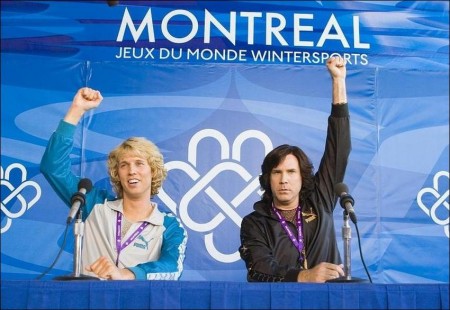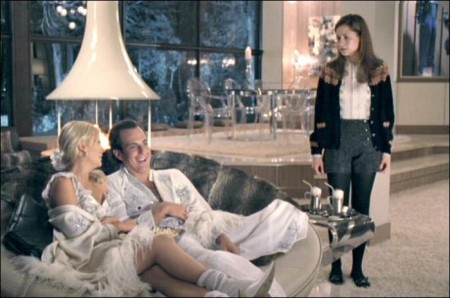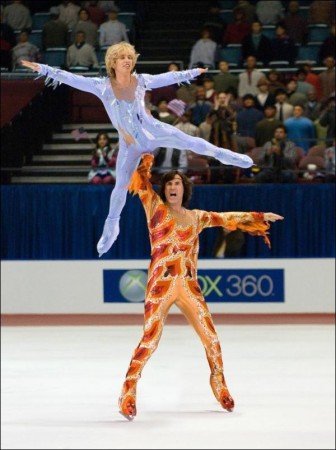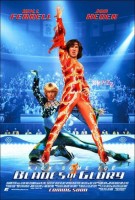Tagline: Kick some ice.
When rival figure skaters Chazz Michael Michaels (Will Ferrell) and Jimmy MacElroy (Jon Heder) go ballistic in an embarrassing, no-holds-barred fight at the World Championships, they are stripped of their gold medals and banned from the sport for life. Now, three-and-a-half years on, they’ve found a loophole that will allow them to compete: if they can put aside their differences, they can skate together – in pairs’ figure skating.
Perhaps nowhere in sports is the marriage of athleticism and grace more evident than in the arena of world champion pairs figure skating-the lifts, the jumps, the routines. The perfect score results from the perfect blend of strength and sophistication, prowess and artistry, brawn and refinement. It’s an elegant world, a rarefied universe, a noble place populated by the crème de la crème of skating elite. Well, it used to be …
When the macho, swaggering Chazz Michael Michaels (Will Ferrell) takes to the rink, he is the rock star of the arena, leaving a trail of thrashed ice and shrieking female fans in his wake. The only competitor who can match Michaels’ scores (on the ice, that is) is the driven former child prodigy, Jimmy MacElroy (Jon Heder). Spotted as a youth executing triple lutzes on the frozen pond of an orphanage, MacElroy was whisked away to days of endless training, and now stands as the picture of poise, the personification of the highest ideals of the men’s sport.
Michaels and MacElroy have met in finals rounds before, but their latest head-to-head at the World Championships-when they tie for first-is more than either one can bear, and their longstanding rivalry erupts into a no-holds-barred fight. The ensuing brawl not only sets fire to the World Championship’s helpless mascot, but lands both athletes in hot water: Chazz and Jimmy are called before the sport’s governing board, stripped of their gold medals and banned from the sport for life.
Now, three-and-a-half years later, both men are still trying to find their way in a world without competitive skating. Michaels has devolved into a drunken party machine, skating as a costumed evil wizard in a kiddie ice review, and MacElroy has been banished to the shoe department of a chain sporting goods store.
But then, inspiration (in the form of an over-friendly, former stalker of Jimmy’s) strikes, and a loophole emerges. To skate again, all Chazz and Jimmy have to do is set aside their long festering hatred of one another and join forces-as the first male/male figure skating pair to compete in the history of the sport… if the sport survives, that is.
Ice Follies: The Making of Blades of Glory
When Ben Stiller and Stuart Cornfeld bought the spec script “Blades of Glory” for their company, Red Hour Films, they decided, as the sporting slogan goes, to just do it.
Stiller relates, “We got sent this script, which was about the first male figure skating team pair—these two brothers had written it, and one of them was working at a Starbucks, I think. Anyway, it was one of those scripts where you go, ‘Wow, I can’t believe nobody’s done a movie of this.’ It’s just such a funny idea, so we decided to try to get it made.”
“Blades of Glory” centers on the comic travails of two disgraced world champion skaters who must overcome their considerable differences and get back in the game by becoming the first competitive male pairs figure skaters in history.
It seemed as if “Blades” was destined to be a film where good things come in twos—particularly when the search for a director began. Red Hour, which is committed to finding new talent, had been talking with a prominent directing pair from the field of advertising and music videos, Will Speck and Josh Gordon; the duo had made a quick reputation for themselves with their wry and hip series of Geico insurance commercials featuring a group of peeved cavemen, in addition to their Oscar nominated short film, “Culture.“
“The thing I responded to most in their work was the comedy, which was based very much in character,” says Stuart Cornfeld. “They were able to take an idiosyncratic character and were just relaxed enough to move him to a comedic place that was eccentric, but still totally relatable.”
Per Stiller: “Will and Josh have directed so many commercials that they’re actually incredibly experienced. They had to come in and work with a lot of different elements—they took the skating very seriously. They took the comedy very seriously. They skated themselves. I saw them out there. They definitely got their feet dirty, as they say.”
For Speck and Gordon, the world of skating presented a fertile ground for satire: a realistic setting rife with some wonderfully over the top elements—the sometimes overblown musical accompaniment, the lavish costumes, the behindthe scenes personal dramas—all of which could be turned on their head to comic effect.
“The commitment the two main characters have made to this sport, which has so many fantasy and fashion elements to it, opened the story up to many levels of comedic possibility. The thing we loved is that the world of figure skaters is such a specific sort of strange little universe that has its own brand of caste system, logic, sense of style, rules and celebrity,” says Speck.
“The fact that there’s this little world unto itself that we can explore— that’s very interesting to us. The script also had several unique supporting characters that go a long way toward populating that world,” adds Gordon. “And that, to us, was very appealing.”
While two heads are often better than one, the question does beg to be asked: how do two people direct a film simultaneously? (Answer: Any way that works.)
Adds Cornfeld: “In pre]production, Josh spent a little more time on the technical issues, while Will focused more on the script. But once we started shooting, it was very much a collaboration. They were always in sync when a decision had to be made.”
While the behind]the]scenes world of directing the film fell to a twosome (the pair of Speck & Gordon), the on]screen story would need to be carried by a duo of comic actors, each possessing the ability to hold his own on and off the ice, while also being able to complement each other, stylistically speaking.
“One of the things that drew us to the script is the dichotomy of the two leads. They’re such opposites,” says Gordon. “Chazz Michael Michaels is a guy who wears all his emotions on his sleeve, and yet is very vulnerable, whereas Jimmy MacElroy is someone who’s led a very sheltered life.”
Adds Speck: “They perfectly mirror one another, yet both are completely dysfunctional. Each needs to learn from the other guy a little bit in order to get on with his life.”
Early on, Red Hour approached Jon Heder (who rose to instant stardom as the eponymous “Napoleon Dynamite”) and asked him if he’d be interested in the role of Jimmy, a young man who eats, sleeps and breathes skating … and has for almost his entire life.
“What’s interesting about Jon,” says Cornfeld, “is that he’s a very, very, very physical comedian and he’s got this loveable core. One of the tough things about a character like Jimmy MacElroy is that he’s a narcissist, and when you have that kind of character, you want an actor who can play him in a loveably narcissistic way.”
For the role of Michaels, one name, say the filmmakers, immediately leapt to mind: Will Ferrell, whose résumé of unforgettable comic personas includes Buddy the Elf, Ron Burgundy and, most recently, Ricky Bobby and Harold Crick, to name a few.
Speck observes, “Will Ferrell has been creating great characters for years, starting with ‘SNL’ and continuing in film. He is an amazing performer who’s so good at what he does that you forget that, as the saying goes, ‘comedy is hard.’”
Gordon says, ”He brings exactly the right mix to Chazz, which is part swagger and machismo, and part overgrown kid. He was really the only one we thought of in the part.”
Stiller adds, “I think you look at what Will Ferrell does on the ice—skating is all about attitude. It’s much less about technical, I don’t even wanna say, ‘perfection,’ because it’s not even that level. It’s more like technical ‘ability,’ which is, you know, not very high, but not very necessary when you have that much attitude. It’s like attitude ability. Well, if I’ve got a lot of attitude, I don’t have to worry about my ability.
So for Will Ferrell, to get out on the ice and do his thing and to see him, we call it the two ‘A’s,’ attitude and ability. And Will’s got big A, little A. Jon Heder’s got, like, little]A, much]bigger]A on the ability. And you put it together, and you get … like, a quadruple A.”
“Will is one of our most gifted actor comedians,” finishes Cornfeld, “someone who commits himself fully to finding both the comedy and the emotional reality of a character.”
Jacobs adds, “It struck me as a totally magical pairing. If you saw ‘Napoleon Dynamite,’ you know that Jon is a subtle comic who throws his lines almost over his shoulder, while Will’s brilliance is improv. We saw that they would work off each other brilliantly, picking things up from each other’s style, which would ultimately enhance both their styles.”
As far as Ferrell was concerned, when they approached him for “Blades of Glory,” they had him at hello. “Just the premise of two men skating together made me laugh,” he admits. “The world of figure skating just lends itself to all kinds of comic possibilities. I’m surprised no one has ever thought of making a movie about it before.”
He also found the character of Chazz impossible to resist. “He’s this kind of bad boy of skating and so sexy. And I do sexy very well.” He adds, wryly, “Plus, I get to wear little facial tattoos, which is a real perk.”
What really sold Ferrell, however, was the personality differences between his character and Jimmy, and the antagonism that develops because of that. “Chazz is someone who plays to the crowd. He has his own fan section. He’s very rock ‘n’ roll, all sex and showmanship. Jimmy is all about technique and form, kind of like classical music. They’re from two separate worlds and that drives the rivalry between them.”
For Heder, two factors were the main draws to signing on to “Blades of Glory”: acting across from Ferrell while on top of frozen water. “I thought it would be fun to do something as physical and weird and fun as ice skating,” he says. “I did a little bit of roller skating growing up, but I’ve only been on ice skates maybe once or twice. So, I was like, ‘All right, this’ll be fun, to really get into it and try to skate.’ And then, to get to work with a comedy giant like Will Ferrell in a movie produced by Ben Stiller … well, how could I say no to that?”
Continuing to cotton to the theory that two heads are better than one, the filmmakers cast the pivotal roles of the outlandish villains Stranz and Fairchild Van Waldenberg—the brother/sister skating team whose champion status is threatened by Chazz and Jimmy—with the adept comic performers (and real life husband and wife) Will Arnett and Amy Poehler.
Speck and Gordon comment, “Amy and Will walk that fine line in comedy that is so difficult to tread—this kind of humor is about amplifying recognizable idiosyncrasies, and that’s what makes people laugh. If a performer gets too broad, you’re pounding people over the head with a shovel. There’s art in their subtlety, and those subtle choices combine to build larger]than]life characters. Their work is just great and hilarious.”
Unlike Heder, Arnett is no stranger to ice skates. “I grew up in Canada, so I think that it’s part of your birthright to be able to skate,” he says. Arnett relishes the role of comic antagonist, which he played so memorably in the Emmy winning “Arrested Development” and in the Robin Williams starrer “RV.”
Cornfeld observes that Arnett is more than willing to go out on a limb with his comedy: “One of the things that’s amazing about Will is that he’s really good looking, and yet he’s willing to push, in a comedic way, way beyond that. He has this likeable personality, but he doesn’t use it to get the audience to like him. He’s willing to just go out there as far as he can. It’s really fascinating to watch.”
The Stranz and Fairchild relationship is intense and a bit … well, off, according to Poehler, who has demonstrated her mastery for comic subtext during her many years on “Saturday Night Live.” But she doesn’t want the audience to get any wrong ideas about them. She reasons, “Sure, Stranz and Fairchild spend a lot of time training together. They often have to do very intricate moves in very tight spaces. And some people feel that they’re a little too close. But that’s because they both want to win. The idea of winning excites them.”
The odd girl out in Camp Van Waldenberg is the duo’s wallflower sister, Katie, who inadvertently falls for Jimmy MacElroy. Brimming with charm and looks, she played with subtle glee by Jenna Fischer (from the hit “The Office”). After Katie’s blooming interest in MacElroy comes to the attention of her brother and sister, Stranz and Fairchild guilt her into conspiring with them to bring down the competition.
Fischer relished playing the somewhat offbeat Katie, and was immediately interested in joining the impressive cast. But it was a sequence with Ferrell’s Chazz Michael Michaels that made her immediately pick up the phone and call her agent. “The scene that really made me want to do the movie is the one in which Katie reluctantly seduces Chazz. I loved the idea of a comedic seduction scene, because they really are so much fun to play—walking that tightrope between suggestive and silly. And since Will Ferrell was playing Chazz, I knew he was going to make it really funny.”
When it came time to cast the role of Coach in the film, who else would the filmmakers turn to than the man who made “Coach” a household name in the long]running TV series? Coach initially is Jimmy’s trainer, but takes over the volatile Chazz and Jimmy when they decide to try pairs skating.
“You just accept Craig T. Nelson as a coach,” says Speck, “not sure why. No, no. Really, he has gravitas, combined with this dry sense of humor. Isn’t that what the perfect coach has? In his films and television roles, he plays a dad or a cowboy or a professor—these authority figures. But no matter who he plays, it seems like we’re always waiting to see that flash of humor.”
Gordon comments, “We thought it would be great to have his sense of weight in this offbeat, hermetic little universe. And his coach comes off as a little driven, almost a borderline, ‘blow at any minute’ guy…which is funny, when the reason you’re about to blow is about sequins or a choreographed move.”
“Craig is a great actor,” adds Cornfeld, “and very committed. He’s more than willing to play the reality in an absurd situation and let the comedy come from that.”
“The thing about Coach is that he’s got a lot of issues, and the guy he’s attached to is trying to help him channel them through things like stained glass and pottery classes,” says Nelson.
Nelson’s main reason for taking the role, however, was the chance to skate—and get paid for it—though he hadn’t donned a pair of skates in several years. “It had been a long time since I’d skated. I played hockey as a kid and loved it—I thought I wanted to be a hockey player when I was growing up. But that was hockey, not figure skating. When I got back on the ice again, I had a great fear of falling down. Fortunately, I had a great coach, Bobby Beauchamp, who helped me get familiar with the ice again. It was a blast.”
Another of the unique comic characters found in “Blades of Glory” is Hector, Jimmy MacElroy’s obsessive No. 1 fan, played by comedian and writer Nick Swardson (“Malibu’s Most Wanted,” “The Benchwarmers”).
“Hector travels around with a teddy bear and a scrapbook, a photo album of Jimmy that is very in]depth, very intricate,” relates Swardson. “He’s put a lot of time into it … and a lot of glitter. Jimmy’s a little freaked out by him and has a restraining order out on him. But Hector shows up randomly throughout the movie and torments Jimmy. So, yeah, I guess you’d call him a kind of a stalker, but I think that’s a little harsh.”
But Hector also serves as the impetus to set the union of Jimmy and Chazz in motion. “When Jimmy is banned from skating, Hector’s whole world crashes down on him,” says Swardson. “So he finds this loophole that Jimmy can skate again if he’s part of a pair.”
Making an appearance as the head of a touring skating troupe putting on a show called “The Grublets” (think skaters in animal costumes) is “The Daily Show” veteran Rob Corddry.
“My character, Bryce, takes disgraced skaters like Chazz and plugs them into the Grublets, who are sort of these magical woodland creatures, like elves or gnomes. I have a scene with Will and one with Jon. It’s all I’ve talked about for months.”
Lending an air of authenticity to “Blades of Glory” is former skating champion Scott Hamilton, who is teamed with commentator Jim Lampley; both play variations on themselves as ringside analysts. Hamilton has been offered roles in skating movies before, but turned them all down, he says. “Blades of Glory,” however, was impossible to resist, he laughs, “Because I get to play a version of myself without having to be myself.”
Production notes provided by DreamWorks Pictures.
Blades of Glory
Starring: Will Ferrell, Jon Heder, Will Arnett, Amy Poehler, William Fichtner, Jenna Fischer, Romany Malco
Directed by: Will Speck & Josh Gordon
Screenplay by: Jeff Cox, Craig Cox, John Altschuler
Release Date: March 30th, 2007
MPAA Rating: PG-13 for crude and sexual humor, language, a comic violent image and some drug references.
Studio: DreamWorks Pictures
Box Office Totals
Domestic: $118,594,548 (81.4%)
Foreign: $27,114,094 (18.6%)
Total: $145,708,642 (Worldwide)



